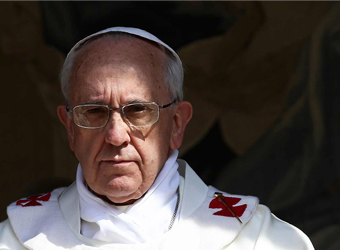The charging of a top Vatican official, Cardinal George Pell, with sex-abuse crimes this week will permanently stain the legacy of Pope Francis, exposing poor judgment in his appointment, victims of sexual abuse said.
Francis’ appointment of Pell, dogged for many years by victims’ allegations that he shielded abusers and had himself molested two young boys in the 1960s, underscores a lack of sufficient vetting for top Vatican posts, Vatican sources said.
Pell, appointed as Francis’ economy minister in 2014, has always strongly denied he molested children or turned a blind eye to abuses. On Thursday, Australian police charged him with historical sex crimes after a two-year investigation.
The charges bring the Church’s global abuse scandal to the heart of the Vatican and, according to victims and their advocates, weaken the pope’s credibility in tackling a decades-old crisis against which he vowed “zero tolerance”.
“I think his legacy is under severe threat,” said Peter Saunders, a victim of clergy abuse who took a leave of absence from the papal advisory commission on abuse last year in protest over a lack of progress.
“I genuinely thought when I met with Francis three years ago that ‘this man is the real deal’ and he is going to get on with things and I really thought there was a prospect of real, significant, and rapid change,” Saunders, a Briton, said in a telephone interview.
“But he is surrounded by people who don’t want change.”
The affair threatens to overshadow accolades the Argentine pope has won since his election in 2013 for bringing the Church closer to the poor and migrants and making it more welcoming to those who felt excluded in the past, such as homosexuals
Church sexual abuse broke into the open in the United States with reports of cases in Louisiana in 1984 and exploded in 2002, when journalists in Boston found that bishops had systematically moved abusers to new posts instead of defrocking them.
Thousands of cases have come to light around the world as investigations have encouraged long-silent victims to go public, shattering the Church’s reputation in places such as Ireland, and more than $2 billion has been paid in compensation
Pell, 76, has taken a leave of absence in order to return to Australia, saying: “I am looking forward finally to having my day in court. I repeat that I am innocent of these charges.”
Victims groups have accused Pell of mishandling cases of abuse when he was in Australia as archbishop of Melbourne and later Sydney.
Pell told an Australian inquiry last year that the Church had made “catastrophic” choices by refusing to believe abused children, shuffling abusive priests from parish to parish, and relying too heavily on the counsel of priests to solve the problem. He denied involvement in any cover-up.
Australian police did not detail the charges or specify the ages of the alleged victims or the period when the crimes were alleged to have occurred. Pell was ordered to appear before Melbourne Magistrates’ Court on July 26.
Marie Collins of Ireland, another non-clerical member of the Vatican commission Francis established in 2014, and also a victim of priestly abuse when she was a child, quit in frustration in March, citing a “shameful” lack of cooperation within the Vatican..
“What I have no hesitation in saying is that it has been proved that Cardinal Pell is guilty of the appalling mishandling of cases of abuse when still in place in Australia and causing untold pain to the victims in those cases,” she wrote on her website.
“The fact that Cardinal Pell was appointed to a very senior post in the Vatican rather than having to face any sanction for his mishandling of abuse cases was a slap in the face to all those he had let down so badly,” she wrote.
The Pell case also pointed to what Vatican insiders says is an inherently opaque and lax system for the appointment of some officials and a tendency to look the other way if the pope really wants someone whose past may be less than limpid.
“There really is no structured vetting process for top Vatican jobs as there is for when a priest is made a bishop or when a bishop is made a cardinal,” said a Vatican source who follows abuse cases.
“When someone is already a cardinal, as Pell was in Sydney, the feeling is that there is little left to vet,” the priest said, speaking on the condition of anonymity because he was not authorized to talk about the Pell case.
Francis was impressed by Pell when they met in 2013. In meetings among cardinals before the conclave that elected Francis pope that year, the former Australian Rules football player stood out not only for his height and broad shoulders but also for his command of financial matters.
After becoming pope, Francis, hoping to put an end to Vatican financial scandals, moved Pell to Rome to head a new ministry, the Secretariat for the Economy.
More than a decade earlier, in 2002, Pell, the then archbishop of Sydney, faced an internal Church investigation relating to allegations that he had molested two boys at a holiday camp in the early 1960s when he was a trainee priest.
A retired Australian judge, Alex Southwell, ran a closed hearing at a Melbourne hotel. He wrote in his findings that the alleged victim appeared to be telling the truth but that there was no evidence to substantiate it.
He concluded that he was “not satisfied the complaint has been established”, citing lack of evidence, Pell’s sworn denial and the complainant’s later alcoholism and criminal history.
Source: Reuters


